Ethereum update allows wallets to operate as smart contracts

Core ethereum (ETH) developers have launched a new software feature called EntryPoint that allows wallet accounts to function as smart contracts.
The new feature aims to bring so-called “account abstraction.” Crypto account abstraction is a mechanism that enables wallets to handle complex tasks automatically without requiring users to interact with the underlying blockchain.
It is an optional feature usually offered to users by crypto wallet providers rather than a protocol-level change in cryptocurrencies like ethereum. By abstracting away the details of the blockchain, users can implement advanced features such as automated payments and account recovery more quickly.
With account abstraction, wallet apps can achieve “smart wallet” features like two-factor authentication recovery options and native multi-signatures. It is designed to improve the user experience of crypto wallets, making them more accessible and more intuitive to use.
The Block reported that after a thorough security audit by OpenZeppelin, EntryPoint was launched and is now accessible on various blockchain networks, including Ethereum, Polygon, Arbitrum, and BNB Chain. EntryPoint will enable account abstraction on all those ethereum-based protocols.
EntryPoint is part of the much broader ethereum request for comments (ERC) 4337 that describes features such as automated payments and two-factor authentication recovery options. EntryPoint is nothing more than a thoroughly audited smart contract meant to be used by third parties to ensure that wallet abstraction can be implemented safely — it does not change the base protocol.
The EntryPoint contract allows wallet infrastructure providers to offer more options for smart wallet features, including native multi-signatures, account recovery, and gas fee coverage for users, according to Michael Lewellen, head of solutions architecture at OpenZeppelin. The ERC-4337 Ethereum Magicians page clearly explains that the EntryPoin “contract will need to be very heavily audited and formally verified because it will serve as a central trust point for all EIP-4337.”
In other words, the safety of the whole architecture allowing for account abstraction on those protocols relies on how securely it is implemented in that one contract. ERC’s documentation notes that this results in “concentrating security risk in the entry point contract that needs to be verified to be very robust.”
The development follows a recent report about implementing account abstraction by layer two-specialized wallet BLS Wallet launched an integration with smart contract layer ethereum layer two protocol Metis (METIS) — promising feeless transactions.

















